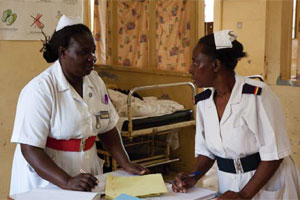

Diabetes: Global Perspective
Diabetes: A Global Perspective
Over the years, Meredith A. Hawkins, M.D., professor of medicine (endocrinology) and director of Einstein's Global Diabetes Initiative (GDI), has met countless people with diabetes, each with a tale to tell. One especially heartrending story involves Isaac, an orphaned Ugandan teen with diabetes who sells his insulin to buy food for his grandmother. Regular hospitalizations are a way of life.
 Isaac exemplifies the dire situation confronting more than 200 million people with diabetes who live in impoverished countries where proper care is hard to find. But Dr. Hawkins is undaunted. For the last decade, she has been crisscrossing the globe, laying the groundwork for grassroots campaigns to improve diabetes training and treatment in Africa, and beyond.
Isaac exemplifies the dire situation confronting more than 200 million people with diabetes who live in impoverished countries where proper care is hard to find. But Dr. Hawkins is undaunted. For the last decade, she has been crisscrossing the globe, laying the groundwork for grassroots campaigns to improve diabetes training and treatment in Africa, and beyond.
The hub of Dr. Hawkins' overseas efforts is Christian Medical College (CMC) in Vellore, India. This outstanding institution has provided comprehensive diabetes training to 120 hospitals around India, serving thousands of patients who would not otherwise have access to the specialized diabetes care they need.
The GDI lends its treatment expertise to this collaborative effort aimed at preventing and treating malnutrition-modulated diabetes— the mysterious form of diabetes that affects Isaac and many other impoverished children in sub- Saharan Africa and Asia.
Sharing the Knowledge
Physicians from dozens of nations have requested the GDI's help with training. "We're now working with CMC to export these clinical training programs to neighboring countries, starting with Nepal and Bangladesh," reports Dr. Hawkins, attending physician in the department of medicine (endocrinology) at Montefiore, the University Hospital and academic medical center for Einstein. One continent over, in Uganda, "our goal is to develop a formal training program in endocrinology with Makerere University in Kampala," she says. "Currently, doctors have to leave the country for advanced training in diabetes, and many don't come back."
Last fall, the GDI team located a very ill Isaac in a rural village and transferred him to a hospital, where he was visited by GDI member Elizabeth A. Walker, Ph.D., R.N., professor of medicine (endocrinology) and of epidemiology & population health. She found that Isaac was suffering from a litany of health problems, from anemia to high blood sugar. "For now," she noted in a blog on Einstein's website, "we're trying to do as much as we can for Isaac and the kind staff caring for him, trusting that, in the process, we will learn more about sustaining the precarious lives of children with diabetes." (Dr. Walker's blog is at www.einstein.yu.edu/special-programs/diabetes/.)
Editor's Note
After the newsletter went to press, Dr. Hawkins learned that Isaac — the Ugandan boy featured in our cover story — has died. Children with malnutrition-modulated diabetes in sub-Saharan Africa usually live no more than a year after diagnosis. But thanks to care from a dedicated nurse, Isaac lived for five years — reason to be optimistic that, with further research, this type of diabetes can be treated or even prevented.
Contributions to benefit kids with malnutrition-modulated diabetes can be sent to the Einstein Diabetes Research Center, 1300 Morris Park Avenue Bronx, NY 10461.
Posted on: Tuesday, June 12, 2012

Tablet Blog